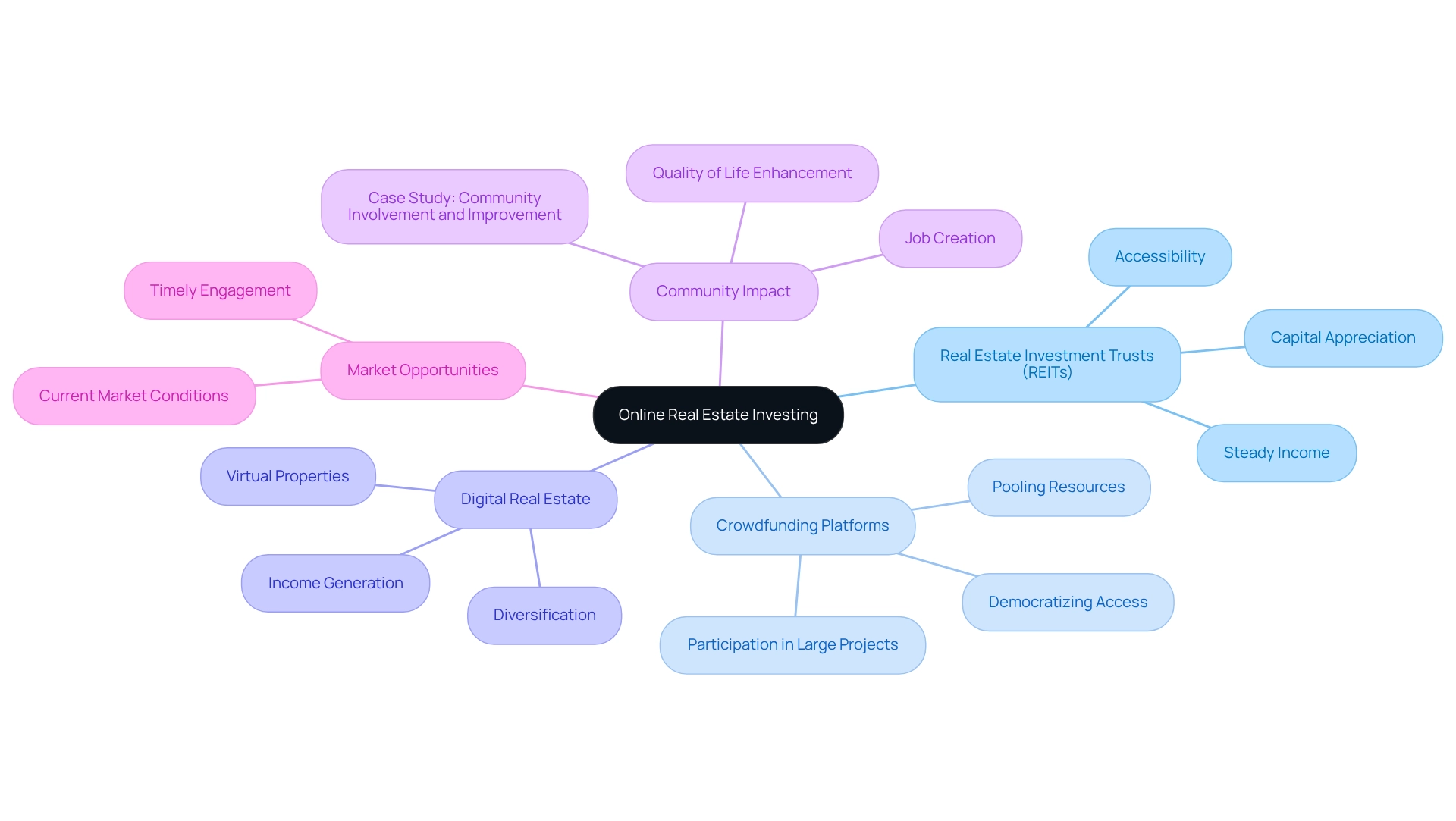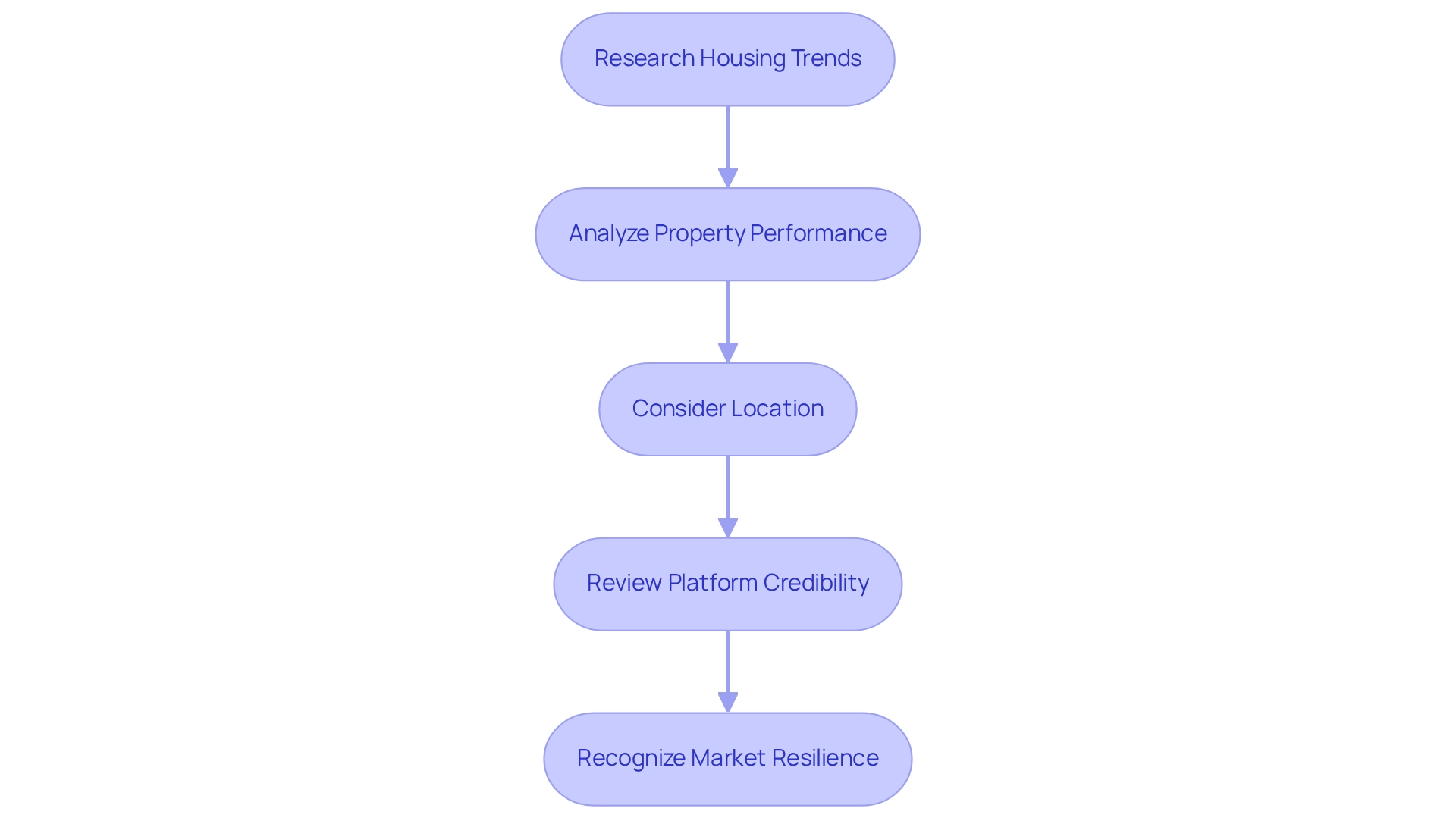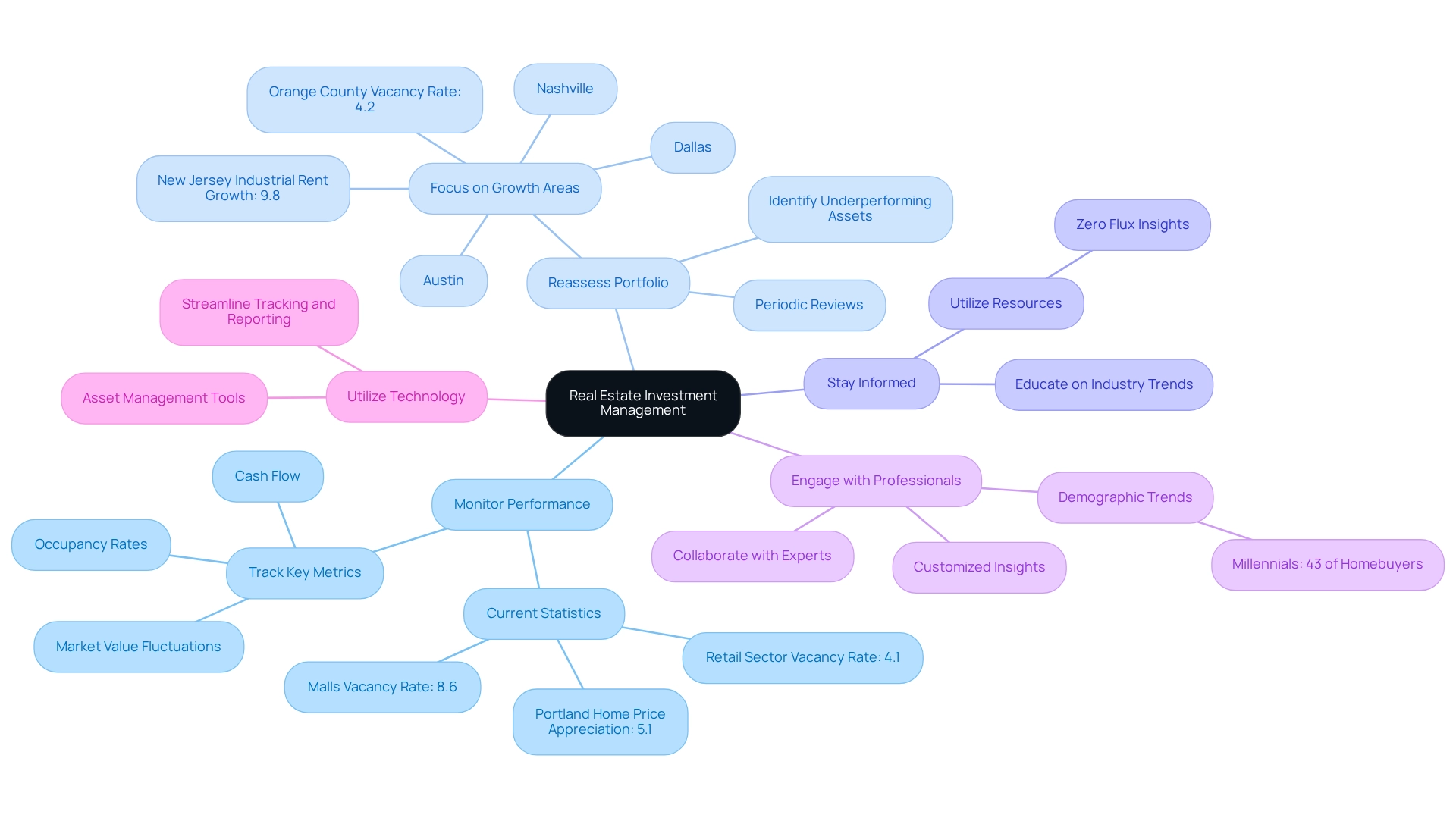Overview
The article delineates four essential steps to master online real estate investing:
- Understanding the fundamentals of online investing
- Identifying and evaluating investment opportunities
- Selecting the appropriate investment platform
- Effectively managing and optimizing investments
Each step is underpinned by practical strategies and insights, such as:
- Leveraging REITs and crowdfunding platforms
- Analyzing housing trends
- Employing technology for efficient portfolio management
This comprehensive guide equips investors with the necessary tools to thrive in the digital real estate market.
Introduction
In the digital age, the landscape of real estate investing is undergoing a revolutionary transformation, making it more accessible and diverse than ever before. With the advent of online platforms, investors can now explore a myriad of opportunities ranging from Real Estate Investment Trusts (REITs) to crowdfunding ventures, all without the burdens of traditional property ownership.
As the market evolves, understanding these innovative investment avenues becomes paramount for those seeking to capitalize on the lucrative potential of real estate. This article delves into the essentials of online real estate investing, equipping readers with the knowledge to:
- Identify promising opportunities
- Select the right platforms
- Manage their investments effectively in a dynamic environment.
Understand the Basics of Online Real Estate Investing
Real estate online investing leverages digital platforms to facilitate investments in property assets without requiring direct ownership. Key concepts include:
-
Real Estate Investment Trusts (REITs): These companies own, operate, or finance income-producing real estate. By acquiring shares in REITs, investors can access property markets without the burdens of managing physical assets. The growth of REITs in 2025 has been remarkable, with many investors recognizing their potential for steady income and capital appreciation.
-
Crowdfunding Platforms: These platforms enable numerous backers to pool their resources to finance property projects, democratizing access to funding opportunities. This method is especially advantageous for those with limited capital, allowing participation in larger projects that would otherwise be unattainable.
-
Digital Real Estate: This category includes virtual properties, such as websites or online businesses, which can yield income. As the digital landscape evolves, investing in digital properties is becoming an increasingly viable option for investors seeking diversification.
Understanding these fundamental concepts is crucial for identifying which asset type aligns with your financial goals and risk tolerance in real estate online investing. Recent trends indicate that opportunities in property are abundant, particularly in the current market environment, where strategic allocations can lead to significant gains. As Rick Renzi astutely noted, "homeownership is the foundation of a robust community," underscoring the broader impact of property contributions on community development and revitalization. For instance, the case study titled 'Community Involvement and Improvement' illustrates how property funding can transform neglected areas into vibrant communities, creating job opportunities and enhancing the quality of life. Successful examples of REITs and crowdfunding platforms further illustrate the potential for investors to positively influence their communities while achieving their financial aspirations. As Will Rogers wisely advised, "Don’t wait to purchase property." Instead, 'Purchase property and be patient,' highlighting the importance of timely engagement in the housing market.

Identify and Evaluate Investment Opportunities
To effectively recognize and assess investment prospects in property, consider the following steps:
-
Research Housing Trends: Stay informed about current real estate trends, demographic shifts, and economic indicators that significantly influence property values. For instance, as of May 2025, inventory shortages are prevalent due to homeowners' reluctance to sell in a high-interest-rate environment, which can alter market dynamics. Furthermore, 36.25% of individuals believe that Trump's policies regarding inflation and tariffs will adversely affect market recovery in 2025, underscoring the necessity of grasping market sentiment.
-
Analyze Property Performance: Concentrate on essential metrics such as cash flow, return on equity (ROE), and capitalization rates. Tools like DealCheck can simplify the analysis of potential properties, enabling a more informed decision-making process.
-
Consider Location: The property's location is paramount to its value. Conduct comprehensive research on neighborhoods to evaluate growth potential, available amenities, and overall demand. Understanding these factors can help identify regions with promising financial opportunities. Notably, a recent case study revealed that despite challenges in the housing sector, 51% of Americans plan to purchase a home in 2025, indicating robust demand for homeownership.
-
Review Platform Credibility: Ensure that the selected platform for real estate online investing has a strong reputation and transparent processes for evaluating opportunities. This diligence will safeguard your assets and enhance your overall experience in the property market. Remember, while 9 out of 10 respondents prefer ownership, some still appreciate the convenience of renting, highlighting the persistent demand for homeownership and its importance in financial strategies.
-
Recognize Market Resilience: Acknowledge the durability of the property sector, which has demonstrated an ability to endure recent challenges. This resilience can provide a more balanced perspective on the current market landscape and inform your financial decisions.

Choose the Right Online Real Estate Investment Platform
When selecting a platform for real estate online investing, consider the following:
-
Funding Alternatives: Seek platforms that provide a range of funding types, such as REITs, crowdfunding, and direct property acquisitions. With the U.S. housing market recording approximately 4.1 million transactions recently, having diverse options can help you capitalize on current market dynamics.
-
Fees and Costs: Understand the fee structure, including management fees, transaction fees, and any hidden costs that may affect your returns. With ninety percent of all millionaires achieving their status through real estate, it is essential to optimize your assets by being mindful of these expenses.
-
User Experience: Evaluate the platform's interface for ease of use, accessibility, and customer support options. A user-friendly experience can significantly influence your financial journey.
-
Transparency and Security: Ensure the platform provides clear information about its funding processes and has robust security measures to protect your data and assets. As industry specialists highlight, transparency is essential for fostering trust in your financial decisions.
-
Reviews and Reputation: Research user reviews and ratings to gauge the platform's reliability and performance. Favorable comments from current users can offer important perspectives on the platform's efficiency and reliability, which can significantly aid those involved in real estate online investing.
By thoughtfully evaluating these elements, investors can make knowledgeable choices that improve their odds of success in the ever-changing property sector. As one Realtor noted, the future outlook involves balancing challenges and opportunities, underscoring the importance of strategic platform selection.

Manage and Optimize Your Real Estate Investments
To effectively manage and optimize your real estate investments, consider implementing the following strategies:
- Regularly Monitor Performance: Track key performance metrics such as cash flow, occupancy rates, and fluctuations in market value. For instance, in 2025, the retail sector boasts a low vacancy rate of 4.1%, while malls face a higher rate of 8.6%. Additionally, Portland, ME has experienced a home price appreciation of 5.1% since Q2-’23. Comprehending these dynamics can assist you in assessing the wellbeing of your assets.
- Reassess Your Portfolio: Conduct periodic reviews of your asset portfolio to pinpoint underperforming assets. This enables you to redirect resources towards more promising prospects, especially in leading areas such as Austin, Dallas, and Nashville, which are presently demonstrating strong growth potential. Notably, Orange County has the lowest vacancy rate at 4.2%, and New Jersey leads in industrial rent growth at 9.8% year-over-year.
- Stay Informed: Continuously educate yourself on industry trends and economic factors that may affect your financial decisions. Utilizing resources like Zero Flux can provide you with timely insights, helping you stay ahead in a swiftly evolving environment.
- Engage with Professionals: Collaborate with real estate experts or financial consultants to gain customized insights and strategies that align with your financial objectives. Their expertise can be invaluable in navigating complex market conditions. As Sharad Mehta remarked, "Millennials represent 43% of homebuyers, despite affordability obstacles," emphasizing the significance of recognizing demographic changes in your financial strategy.
- Utilize Technology: Leverage asset management tools and software to streamline the tracking, reporting, and analysis of your property holdings. These technologies can enhance your ability to monitor performance metrics effectively.
By adopting these strategies, you can enhance your investment management practices and position yourself for success in real estate online investing within the evolving landscape.

Conclusion
The realm of online real estate investing is teeming with opportunities that are revolutionizing the investment landscape. By grasping the fundamentals—such as the functions of REITs, crowdfunding platforms, and digital real estate—investors can make informed decisions that resonate with their financial aspirations. Acknowledging the potential for consistent income and community revitalization highlights that these investment avenues are not just lucrative but also play a vital role in societal advancement.
Assessing investment opportunities necessitates a sharp awareness of market trends, property performance, and location dynamics. Equipped with the right research tools and a focus on reputable platforms, investors can adeptly navigate the intricacies of the market. The significance of thorough due diligence cannot be overstated, as it is crucial for safeguarding investments and maximizing returns.
Moreover, effective investment management relies on the continuous monitoring and strategic reassessment of portfolios. By harnessing technology and collaborating with industry professionals, investors can remain proactive amid market fluctuations and refine their investment strategies. The resilience of the real estate sector, even in the face of challenges, underscores the necessity of adaptability and informed decision-making.
In summary, as the digital landscape evolves, embracing innovative opportunities in online real estate investing is imperative for those aspiring to excel in this dynamic market. The synergy of informed strategies, meticulous platform selection, and proactive management will empower investors to unlock the true potential of their real estate investments, paving the way for financial success and community enhancement.




